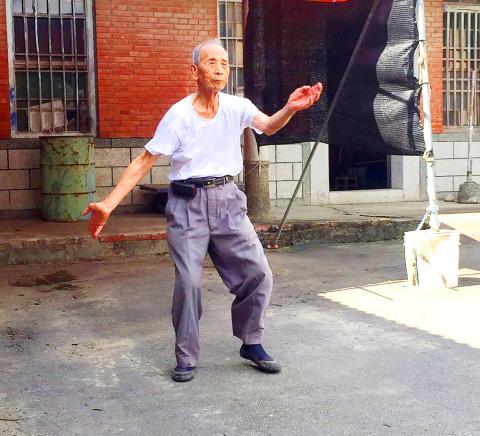The Sports Administration on Wednesday said it would start creating digital records of traditional martial arts indigenous to the nation as the pilot of a digital archive project to document the nation’s sports culture.
The pilot project would begin this year, the agency told a news conference in front the Red House Theater (紅樓劇場) in Taipei’s Ximending (西門町) area.
A martial arts group led by 91-year-old practitioner Lee Lo-tsun (李鑼村) demonstrated traditional hand-to-hand and armed combat techniques at the conference.

Photo: Huang Shu-li, Taipei Times
The agency said it plans to interview and film practitioners like Lee for the project.
A martial art known as Qikan (七崁) — the old Hakka name of Siluo Township (西螺) in Yunlin County — is an indigenous fighting style with nearly 200 years of history, Siluo Martial Arts Foundation president Lee Ming-che (李明哲) said.
However, Qikan masters are aging and local residents are concerned that the martial art will be forgotten, Lee said.
He said the concerns prompted him to ask the agency to preserve records of the martial art in a digital archive, he added.
Historically used by local residents for self-defense and warfare, Qikan includes armed and unarmed fighting styles, according to the foundation’s Web site.
Qikan practitioners use twin short swords, sword and shield, staff, spear or glaive, among other weapons, the Web site said.
Chinese Nationalist Party (KMT) Legislator Chiang Wan-an (蔣萬安) said he is happy to see children among Qikan practitioners.
“Martial arts would be useful at the Legislative Yuan. Maybe the masters can teach me a few moves,” Chiang said.
Sports Administration Director-General Lin Te-fu (林德福) said the agency would also digitize other materials related to the nation’s sports history.
Materials collected from sports academies, professional leagues, Olympic teams and the public would be digitized along with information on traditional sports, he said.
More than 100 people would be interviewed by researchers, and records and materials would be archived in a database for public and academic use, Lin said.
People who have books, memorabilia, photographs, newspaper clippings, video recordings, manuscripts or other relevant material, or know people who can be interviewed for the project, can contact National Taiwan University of Arts, he said.
Additional reporting by Huang Shu-li

The Ministry of Education (MOE) is to launch a new program to encourage international students to stay in Taiwan and explore job opportunities here after graduation, Deputy Minister of Education Yeh Ping-cheng (葉丙成) said on Friday. The government would provide full scholarships for international students to further their studies for two years in Taiwan, so those who want to pursue a master’s degree can consider applying for the program, he said. The fields included are science, technology, engineering, mathematics, semiconductors and finance, Yeh added. The program, called “Intense 2+2,” would also assist international students who completed the two years of further studies in

Former president Tsai Ing-wen (蔡英文) departed for Europe on Friday night, with planned stops in Lithuania and Denmark. Tsai arrived at Taiwan Taoyuan International Airport on Friday night, but did not speak to reporters before departing. Tsai wrote on social media later that the purpose of the trip was to reaffirm the commitment of Taiwanese to working with democratic allies to promote regional security and stability, upholding freedom and democracy, and defending their homeland. She also expressed hope that through joint efforts, Taiwan and Europe would continue to be partners building up economic resilience on the global stage. The former president was to first

Former president Tsai Ing-wen (蔡英文) on Monday called for greater cooperation between Taiwan, Lithuania and the EU to counter threats to information security, including attacks on undersea cables and other critical infrastructure. In a speech at Vilnius University in the Lithuanian capital, Tsai highlighted recent incidents in which vital undersea cables — essential for cross-border data transmission — were severed in the Taiwan Strait and the Baltic Sea over the past year. Taiwanese authorities suspect Chinese sabotage in the incidents near Taiwan’s waters, while EU leaders have said Russia is the likely culprit behind similar breaches in the Baltic. “Taiwan and our European

The Taipei District Court sentenced babysitters Liu Tsai-hsuan (劉彩萱) and Liu Jou-lin (劉若琳) to life and 18 years in prison respectively today for causing the death of a one-year-old boy in December 2023. The Taipei District Prosecutors’ Office said that Liu Tsai-hsuan was entrusted with the care of a one-year-old boy, nicknamed Kai Kai (剴剴), in August 2023 by the Child Welfare League Foundation. From Sept. 1 to Dec. 23 that year, she and her sister Liu Jou-lin allegedly committed acts of abuse against the boy, who was rushed to the hospital with severe injuries on Dec. 24, 2023, but did not